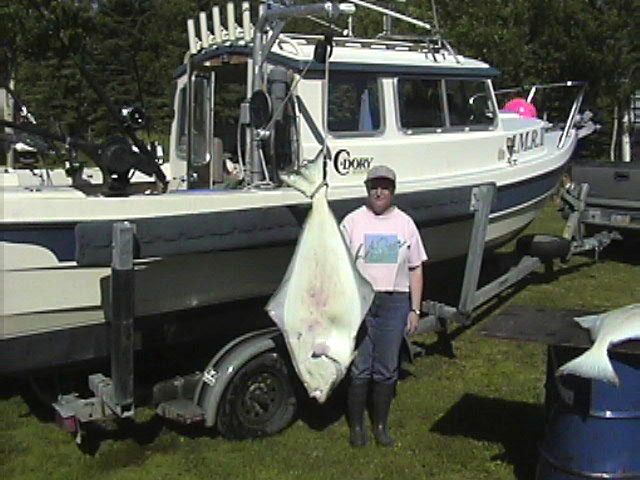| View previous topic :: View next topic |
| Author |
Message |
Wandering Sagebrush
Joined: 21 Jan 2005
Posts: 2783
City/Region: Northeast Oregon
State or Province: OR
C-Dory Year: 2005
C-Dory Model: 22 Cruiser
Vessel Name: Constant Craving
Photos: Constant Craving
|
 Posted: Fri Jan 11, 2008 8:34 pm Post subject: Bunks or Rollers, the question answered... Posted: Fri Jan 11, 2008 8:34 pm Post subject: Bunks or Rollers, the question answered... |
 |
|
| I think that I am very glad that I got a trailer with bunks rather than rollers like my old Arima. Coming back from Tillamook, I saw a commercial boat of about 25 feet that appeared to have shot up the trailer when the driver must have hit the brakes hard. It could probably happen to a trailer with bunks as well, but I suspect that it would be much harder to accomplish |
|
| Back to top |
|
 |
Larry H
Joined: 02 Nov 2003
Posts: 2041
City/Region: Tulalip,
State or Province: WA
C-Dory Year: 1991
C-Dory Model: 22 Cruiser
Photos: Nancy H
|
 Posted: Fri Jan 11, 2008 10:09 pm Post subject: Posted: Fri Jan 11, 2008 10:09 pm Post subject: |
 |
|
The stern of a trailer boat is supposed to be secured to the trailer. In addition, the bow should be restrained with a strap or chain so that the boat cannot slide forward.
In many states, the patrol will give out tickets for lack of proper tiedowns.
_________________
Larry H

A C-Brat since Nov 1, 2003
Ranger Tug 27 ex 'Jacari Maru' 2017 - 2022
Puget Trawler 37 ex 'Jacari Maru' 2006-2017
1991 22' Cruiser, 'Nancy H'--1991-2006 |
|
| Back to top |
|
 |
thataway
Joined: 02 Nov 2003
Posts: 21382
City/Region: Pensacola
State or Province: FL
C-Dory Year: 2007
C-Dory Model: 25 Cruiser
Vessel Name: thataway
Photos: Thataway
|
 Posted: Fri Jan 11, 2008 10:31 pm Post subject: Posted: Fri Jan 11, 2008 10:31 pm Post subject: |
 |
|
To expand on what Larry stated--If you use a wide ratchet strap over the back of the boat, be sure it is behind the cleats so it keeps the boat from going foreward. The chain (I think is preferable to strap) should go to the frame of the trailer, and a turnbuckle would allow the chain to be pulled tight. This would keep the boat from riding up and over the foreward winch post.
There also rachet straps which can be taken to the stern eyes (if present) from the trailer frame.
_________________
Bob Austin
Thataway
Thataway (Ex Seaweed) 2007 25 C Dory May 2018 to Oct. 2021
Thisaway 2006 22' CDory November 2011 to May 2018
Caracal 18 140 Suzuki 2007 to present
Thataway TomCat 255 150 Suzukis June 2006 thru August 2011
C Pelican; 1992, 22 Cruiser, 2002 thru 2006
Frequent Sea; 2003 C D 25, 2007 thru 2009
KA6PKB
Home port: Pensacola FL |
|
| Back to top |
|
 |
Dora~Jean
Joined: 09 Mar 2004
Posts: 1514
City/Region: Simi Valley
State or Province: CA
C-Dory Year: 2003
C-Dory Model: 25 Cruiser
Vessel Name: Dora~Jean
Photos: Dora~Jean
|
 Posted: Fri Jan 11, 2008 10:35 pm Post subject: Posted: Fri Jan 11, 2008 10:35 pm Post subject: |
 |
|
If you have well-backed rear cleats like I do, I just use my extra heavy duty (1/2") mooring lines from each cleat to a closed turnbuckle attached to a hard point on the rear end of the trailer frame on each side. I keep routing it through the turnbuckle and back to the cleat until all of the rope is used, tie off with several half-hitches, freeway ready.
_________________
Steve & Carmen
"Great works are performed not by strength, but perseverance" (Samuel Johnson)
Dora~Jean C-Dory 25 2002-Present
Corsair F-31 Trimaran 1996-2002
MacGregor 26X 1988-1996
Glaspar Seafair Sedan 18 (2)
StarCraft 19 & 22
Catalina 17 & 22
Crestliner 19
+4 Previous, 1/2 sail, 1/2 power |
|
| Back to top |
|
 |
Sea Wolf
Joined: 01 Nov 2003
Posts: 8650
City/Region: Redding
State or Province: CA
C-Dory Year: 1987
C-Dory Model: 22 Cruiser
Vessel Name: Sea Wolf
Photos: Sea Wolf
|
 Posted: Fri Jan 11, 2008 11:30 pm Post subject: Posted: Fri Jan 11, 2008 11:30 pm Post subject: |
 |
|
Lots of good advice here!
Regardless of what system you come up with, be sure the bow is tied down firmly with a foolproof back-up chain or device to tie it down firmly in the event of a malfunction of the winch. Relying on the winch alone is asking for trouble, as the winch pawl can easily jar loose or break, turning the boat totally loose at the bow.
Without a back-up, the boat can slide back on the trailer, especially if the rear tie down system is a strap over placed over the cockpit and running from side to side. That's one of the reasons l like rear tie-down ratcheting straps.
With a roller trailer, especially, don't take the back-up device off the bow until you're fully down the ramp and ready to loosen the winch!
Happy Trailering!
Joe.  
_________________
Sea Wolf, C-Brat #31
Lake Shasta, California
  
"Most of my money I spent on boats and women. The rest I squandered'. " -Annonymous |
|
| Back to top |
|
 |
tsturm
Joined: 01 Nov 2003
Posts: 1165
City/Region: Soldotna
State or Province: AK
C-Dory Year: 2003
C-Dory Model: 25 Cruiser
Vessel Name: JMR TOO
Photos: JMR-TOO
|
 Posted: Sat Jan 12, 2008 1:24 am Post subject: Re: Bunks or Rollers, the question answered... Posted: Sat Jan 12, 2008 1:24 am Post subject: Re: Bunks or Rollers, the question answered... |
 |
|
| Wandering Sagebrush wrote: | | I think that I am very glad that I got a trailer with bunks rather than rollers like my old Arima. Coming back from Tillamook, I saw a commercial boat of about 25 feet that appeared to have shot up the trailer when the driver must have hit the brakes hard. It could probably happen to a trailer with bunks as well, but I suspect that it would be much harder to accomplish |
Bunks & Guide ons is the only way to go! (for me) Strap & Chain on the front & to hell with the rear strap B/S
Had an aluminum (3/16 bottom) boat with a roller trailer for the first 50,000 miles, developed cracks every where a roller touched. Tigged up all the cracks & made it a Bunk trailer never had any problems again (another 30,000mi)
 |
|
| Back to top |
|
 |
Sea Wolf
Joined: 01 Nov 2003
Posts: 8650
City/Region: Redding
State or Province: CA
C-Dory Year: 1987
C-Dory Model: 22 Cruiser
Vessel Name: Sea Wolf
Photos: Sea Wolf
|
 Posted: Mon Feb 25, 2008 4:24 pm Post subject: Posted: Mon Feb 25, 2008 4:24 pm Post subject: |
 |
|
I receive a lot of questions via PMs and emails.
This one had to to do with which type of trailer to buy- single vs. tandem, etc.
I thought I could pretty much refer the question to the proper threads in the Library, but not so!
The topic above really wasn't being answered fully, but discussing whether or not a boat had to be tied down and the proper way to do it.
I know we've discussed this before, but there we no other threads that were titled towards the topic.
(This brings up a point: thread titles must contain direct reference to their content, or they're no help in locating information later!)
With that in mind, I'll post the question and my answer here, and invite others to add to the discussion.
***************************************************
Joe-
I have a 22'-0" c-dory and I'm in the market for a trailer. Which type of
trailer would be suitable i.e. the flat bed type or the type with multiple
rollers? I believe the previous trailer had two flat boards with two large
rollers to guide it on but I'm wondering if the multiple rollers would work
better i.e. with no flat boards. Many thanks in advance for responding.
Regards, Tom
p.s. if you have a photo of the type of trailer best suited, I would
appreciate it.
*****************************************************
Tom-
Does your trailer have the two rollers at the rear or at the front and center?
If they're wide and at the rear you may have a flat bottomed 1980-1986 Classic boat which requires a special trailer.
In general, here's what I can tell you briefly about trailers.
There are advanages and disadvantages to each type, bunk and roller.
Bunk trailers are less expensive, easier to maintain, and simpler to operate. Basically they are a float on/float off system on top of the wheels. By puting them partially in the water but not to the full float level, the boat can be power launched on and off with the boat motor. They work best on moderately sloped ramps, but have problems with very shallow ramps where you can't get the tow vehicle in deep enough to float the boat off, and very steep ramps where lining up and centering the floating boat over the trailer is difficult.
Roller trailers are more expensive to buy and maintain, and must be used with care. The roller system is more complicated and must be watched for any mechanical problems, especially after it reaches 10 or more years in age. Also, you must be sure to not release the winch (or safety chain) until the boat reaches the water, or a malfunction of the winch may result in dumping the boat on the ramp on the way down due to the nature of the slippery rollers.
The roller trailer works not only well on moderate ramps, but on shallow and deep ones too, unlike the bunk trailer. In shallow water, it's much easier to pull the boat up on a set of 32 or so rollers than two or four long, carpeted bunks, although "Liquid Rollers" silicone spray can help the carpet out immensely. Likewise, the roller trailer on a steep ramp works well because the boat can be launched on and off without submerging the trailer so much and using the rollers to help with the friction again.
Some claim that the rollers offer less support than the bunks for the boat, but a boat of the quality of a C-Dory does not distort or dimple in at the rollers. I have 32 rollers on mine with a boat weight of around 3200-3400 lbs, and 100 lbs/roller will not indent a C-Dory hull.
As of late, the roller trailer has become less popular than the bunk trailer, but that's just mostly a trend, perhaps an economic one, and you need to buy which one fits your needs better.
As for the single vs. tandem axle question, it depends on how much you will be towing the boat.
The single axle trailer is OK for short trips, but the tandem is better for longer trips and rides better, too. Moreover, a blowout will be less of a life threatening experience on a tandem axle than a single one. You will lose a tire with either one, but the tandem will let you get safely off the road with the remaining three tires, and often to the next exit or further. A blowout on a single axle trailer can be a very dangerous thing to handle, and you must get over and stop ASAP.
Get disc brakes rather than drum brakes if you can. They rust less, are easier to flush out (salt water), and generally more compatible with use with an immersion system like a boat trailer.
Aluminum trailers are lighter and corrode less, but are more expensive initially. We're seeing more and more of them.
As for steel trailers, the painted trailer is the least expensive, but a galvanized trailer will last a lot longer and is usually cost effective.
LED lights are the rage now, and come with more expensive trailers. They're not bulletproof, however. You can always convert over to them later. Most trailers have cheap wiring that fails sooner or later anyway, requiring replacement.
**********
Go to the Forums, then scroll down to the Library (mechanical section) and look through the trailer topics and detail photos. Much of this has been discussed before in great detail, but you may have to read though the body content of the treads to find it!
Good Luck!
Joe.   |
|
| Back to top |
|
 |
|
|
You cannot post new topics in this forum
You cannot reply to topics in this forum
You cannot edit your posts in this forum
You cannot delete your posts in this forum
You cannot vote in polls in this forum
You cannot attach files in this forum
You cannot download files in this forum
|
|

 Search
Search Private Messages
Private Messages Profile
Profile Log in
Log in Register
Register Help
Help







